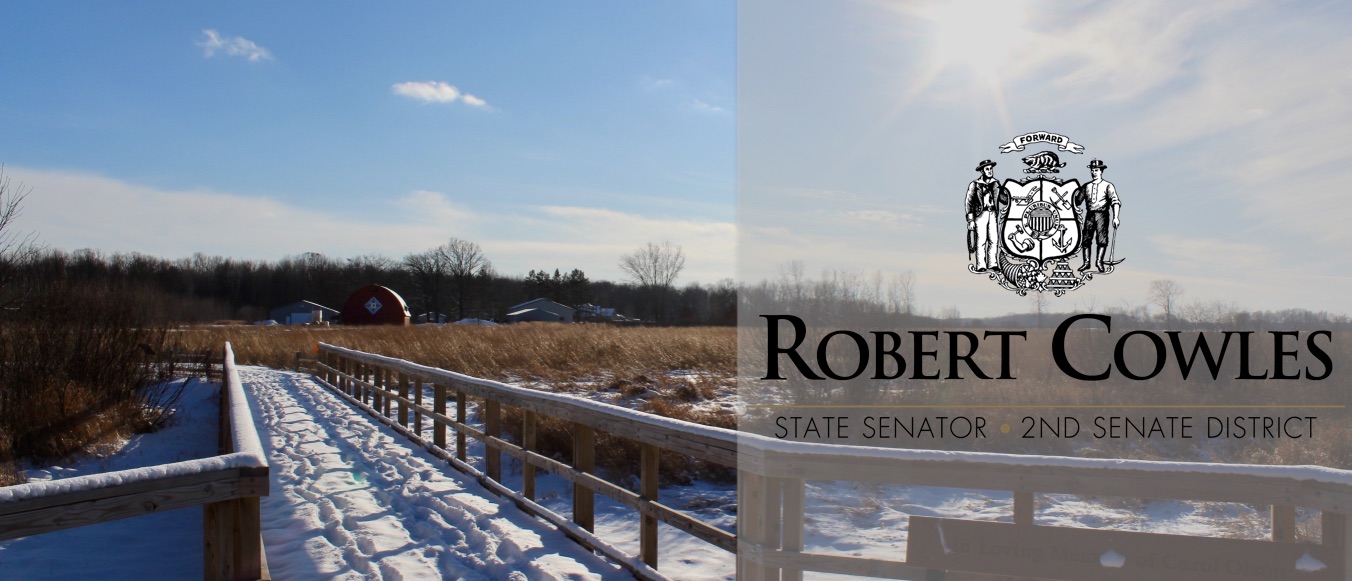|
Robert Cowles
Serving Wisconsin's 2nd Senate District
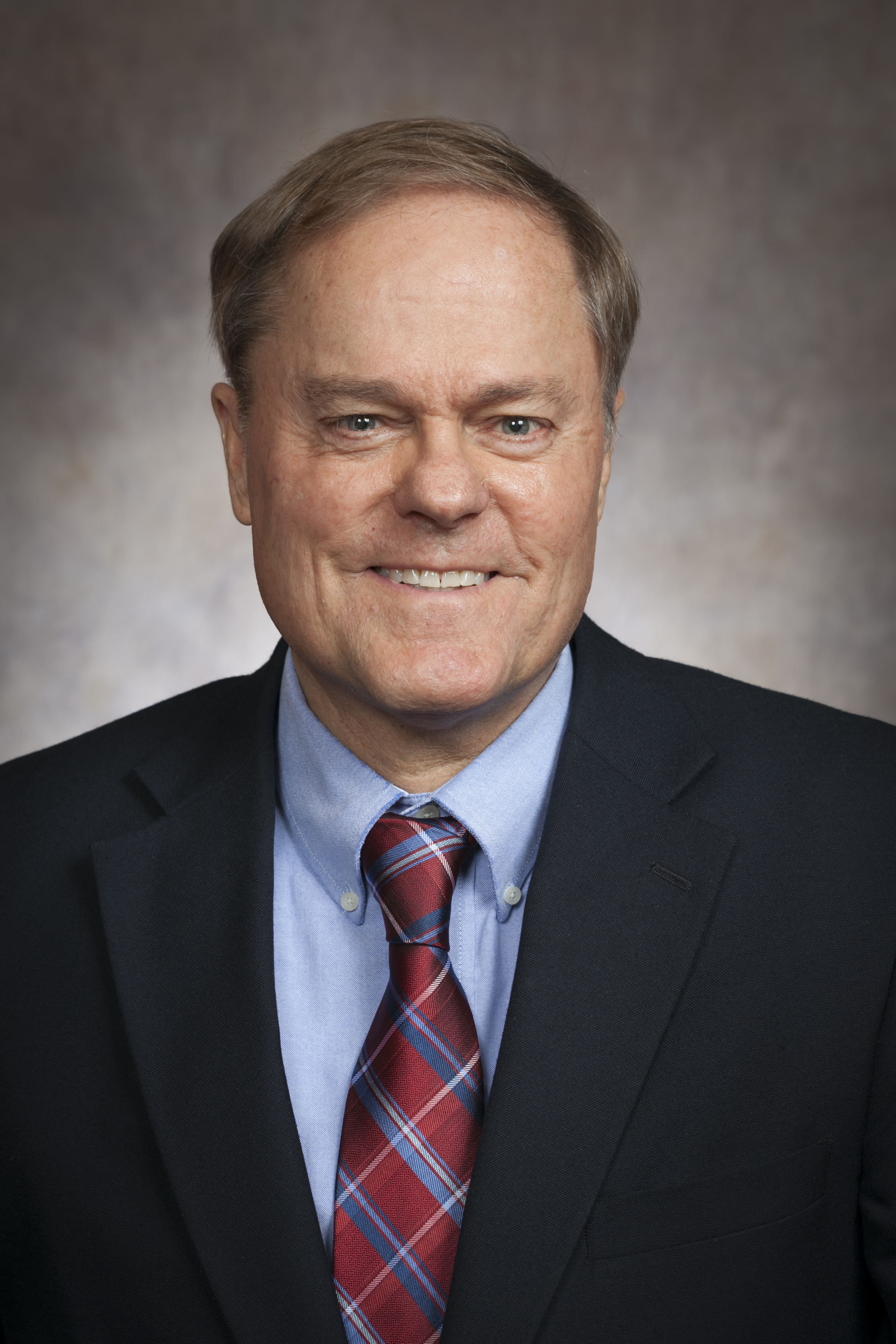



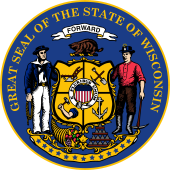

|
|
Quick Fact |
|
The name ĎWisconsiní evolved from ĎMeskonsing,í an
English spelling of the French version of the Miami
Indian name referencing red sandstone bluffs of the
Dells along the Wisconsin River.
Learn more about the root of Wisconsinís name on the
Wisconsin State Journalís website.
|
|
Helpful Links |
|
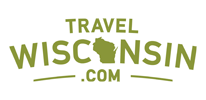




|
|
|
Standing with Tailgaters |
|
While we are still six months away from tailgating
season in Green Bay, I recently learned that last-minute
changes to
Assembly Bill 433 could put the gameday tradition of
tailgating at risk. On Sundays in Fall, Green Bay comes
to a halt as t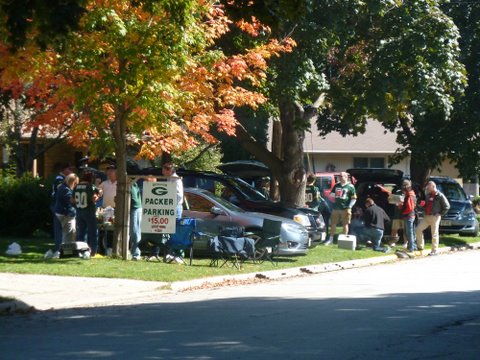 he
city roots on our Packers. But before kickoff, thereís a
tradition surrounding pregame festivities
at Lambeau thatís revered by residents and visitors
alike. While tailgaters are not the intended target
of this legislation, events like Packersí gameday are
the unintended consequences of the amended bill. he
city roots on our Packers. But before kickoff, thereís a
tradition surrounding pregame festivities
at Lambeau thatís revered by residents and visitors
alike. While tailgaters are not the intended target
of this legislation, events like Packersí gameday are
the unintended consequences of the amended bill.
While I supported AB 433, a bill with the worthy
intention of extending the hours of operations for
wineries, recent changes to this bill mean that
tailgating could soon be against the law. Tailgating is
synonymous with not only Green Bay, but Wisconsin, and I
believe it is simply unreasonable to ask a homeowner to
apply for a liquor license to allow a few tailgaters to
get ready for gameday in their yard.
As a result, I have withdrawn my co-sponsorship of
Assembly Bill 433 and choose to stand with the valued
tradition of enjoying a beer and brat with friends in
the frozen tundra.
Learn more about these last-minute changes at the link
below.

|
|
Leading on Lead Act Signed into Law
|
|
February 21st was an important day for public health in
Wisconsin, as one of the nationís first pieces of
comprehensive legislation to remove lead water pipes
from our communities was signed into law.
2017 Senate Bill 48, which was authored by
Representative Thiesfeldt (R-Fond du Lac) and myself,
addresses the public health concerns that thousands of
Wisconsin residents, especially children are faced with
every day from lead laden drinking water.
Wisconsin has over 170,000 lead service lines, and an
EPA study showed that the number of Wisconsin children
poisoned by lead is higher than the national average.
Exposure to lead, especially for children and pregnant
women, can lead a number of negative health effects,
including developmental delays, learning difficulties
and birth defects.
Communities of all sizes throughout Wisconsin have lead
service lines providing water to their citizens, and as
a result, Senate Bill 48 recognizes that a one-size fits
all solution will not work for Wisconsin. While the
scope of the problem in each community is different, the
local control provided by this bill will help to remove
this harmful water infrastructure while addressing one
of the largest public health concerns Wisconsin families
face.
Senate Bill 48 provides a funding mechanism for
communities to address lead contamination in drinking
water. This bill allows a municipal government to pass
an ordinance to ask the Public Service Commission for
the authority to use ratepayer dollars for a low or
no-interest loan or an up to 50% grant for private
property owners to replace their lead service lines.
|
|
Special Session and Other Bills Passed by the Senate
|
|
In the last Updates from the State Senate E-Newsletter,
I discussed over a dozen bills Iíve authored that have
seen recent progress in the Legislature. Many other
bills that Iíve co-sponsored or supported with my vote
have also seen recent progress, some of which Iíll
discuss below.
-
I supported
Assembly Bill 835, which increases Wisconsinís
investment in our K12 education. For years, low revenue ceilings have created
a disadvantage for certain schools. Today, we took a
big step towards closing that divide while ensuring
that rural schools have the resources to provide the
quality education all students deserve. Eight school
districts in the 2nd Senate District will benefit,
including Bonduel, Freedom, Howard-Suamico, Little
Chute, New London, Shiocton, Tigerton, and
Wittenberg-Birnamwood. Learn more about this bill on
the
Milwaukee Journal Sentinelís website.
-
Over 100 years ago, Wisconsin established the
workers compensation system between employers and
labor. Under this system, workers
compensation would be the Ďexclusive remedyí for
workplace injuries. However, a recent court decision
ruled that the workers compensation statute doesnít
exclude temporary workers from suing their place of
employment instead of using workers compensation.
This puts an employer at risk and in turn causes
employers to think twice before hiring one of the
over 60,000 Wisconsinites in the temporary
workforce. To fix this, I co-sponsored
Senate Bill 781
with Senator Stroebel and Representative Duchow.
This bill, which is supported by both labor and
business organizations, has passed the legislature
and was signed into law.
-
Senate Bill 415
provides individuals with disabilities the option to
identify their disability on a state issued ID card
such as a driverís license. In the event that a law
enforcement officer requires the individual to turn
over their identification, this bill will help the
officer to better interact with individualís that
have social limitations.
-
Senate Bill 541 provides crucial tools that law
enforcement needs to address the growing issues of
human trafficking and child exploitation.
-
Assembly Bill 653
requires facilities that perform mammograms to
provide a notice to women if the doctor determines
the patient has dense breast tissue. This will help
more women with early breast cancer detection,
prevention, and awareness.
The Legislature also recently finished a
Special Session focused on welfare reform.
There were nine separate
pieces of legislation that were debated and passed in
the Special Session. Those bills included:
-
Special Session Assembly Bills 1 and 2: Strengthens
the work opportunities for able-bodied adults by
encouraging greater work participation through an
expanded 30-hour per week work opportunity and also
expands FoodShare Employment and Training to
able-bodied adults with children who are in school
(Aged 6+).
-
SS AB 3: Increases program integrity by instituting
reasonable asset limits, ensuring only the truly
needy receive public assistance.
-
SS AB 4: Assists individuals receiving public
housing assistance that are struggling with
addiction by testing for substance abuse and
connecting them to resources to help overcome
addiction and connects able-bodied adults utilizing
public housing assistance with employment
opportunities.
-
SS AB 5: Creates a Ďpaycheck styleí Earned Income
Tax Credit payment pilot program to help address
poverty.
-
SS AB 6: Improves performance outcomes in public
assistance by monetarily incentivizing vendors to
place individuals in long-term, good paying jobs.
-
SS AB 7: Creates a framework to implement pay for
success contracting which funds private, free-market
solutions to social problems.
-
SS AB 8: Builds on our commitment to increase child
support compliance statewide by requiring that a
parent comply with court ordered support, or act in
good faith to achieve compliance as a condition of
receiving public assistance.
-
SS AB 9: Creates a savings account program in
Medicaid similar to a Health Savings Account, giving
participants a more active role in their healthcare
choices.
|
|
Recent Events Attended |
|
I have the opportunity to attend a number of community
events each week. These events are central in my role as
an elected official, as they allow me to stay up-to-date
on the latest news from businesses, non-profits, and
local governments. These events also give me a chance to meet great people and recognize the
contributions that so many people make to our
communities. Here is just a sampling of some of the
events Iíve recently attended:
-
At the Capitol, I spoke to Leadership Waupaca
County (pictured below). This UW-Extension program
is dedicated towards developing civic-minded
community leaders and public officials who are
working for a better future for the communities of
Waupaca County. A few weeks later, I also met with
Leadership Shawano County during their visit to the
Capitol.
-
Dr. Martin Luther King Jr.ís birthday is a good time
to reflect on the mission of Dr. King, and thatís
just what I did when I
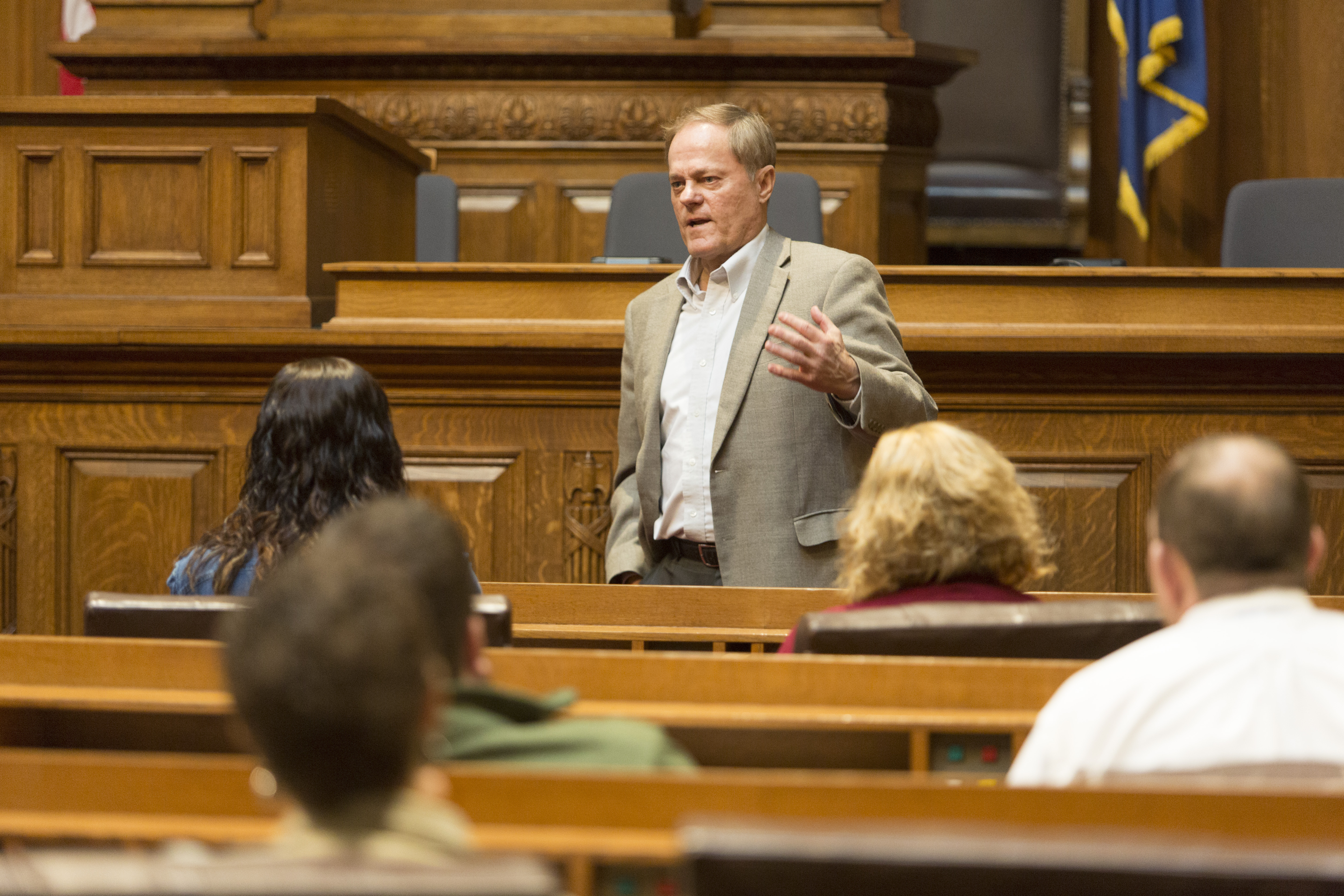 attended
the 23rd Annual community celebration titled
ĎRespect The Dream!í at NWTC. Hosted by Brown County
MLK, this event featured a number of speakers and
performances to honor the life and ideas of Dr.
King. attended
the 23rd Annual community celebration titled
ĎRespect The Dream!í at NWTC. Hosted by Brown County
MLK, this event featured a number of speakers and
performances to honor the life and ideas of Dr.
King.
-
A diagnosis of childhood cancer will be life
changing not only for the child, but for the family
as well. In honor of a young boy who passed from
childhood cancer, his family started Coltonís Cure
to lighten the burden of this diagnosis by providing
the family with assistance. It was an honor to help them continue
their mission by attending the Coltonís Cure
Foundation Gala at Lambeau Field. Learn more about
the organization and the event at
this link.
-
For the 43rd time, the Green Bay Chapter of Trout
Unlimited held their annual Conservation Banquet.
This year, I joined a few hundred local TU members
at Stadium View during their banquet and discussed
my conservation efforts.
-
I also attended the 14th Annual
Fundraiser to benefit Rural (Rx) Health Initiative
in Cecil. This nonprofit program is
designed to address growing concerns regarding
health and safety issues facing todayís farm
families.
-
On National History Day, more than 160 students
exhibited 95 different history-based showcases on
UW-Green Bayís campus. It was a blast to learn more
about these historical events from some young and
enthusiastic students. Learn more about the event on
WLUKís website.
|
|
Audits Provide Recommendations for UW
|
|
As Co-Chair of the Joint Legislative Audit Committee, I
have the responsibility to work with my colleagues in
the Legislature to ensure accountability within state
government. Two recently released audits related to the
University of Wisconsin-System have provided
recommendations for the Committee and the System to
consider.
The first audit,
Report 18-2,
was a financial evaluation of the UW-System in Fiscal
Year 2016-17. The audit confirmed that, overall, the
UW-Systemís financial tracking was in accordance with
generally accepted accounting principles. However, the
nonpartisan Legislative Audit Bureau also reported
concerns related to information technology security
policies, procedures, and controls at the UW-System. IT
security is critical, and I look forward to working with
my colleagues on the Audit Committee and the leadership
of the UW to address this vital issue.
The second audit,
Report 18-4,
looked into the relationships between UW and certain
affiliated foundations that support the mission of
individual UW institutions. The Audit Bureau found that
UW institutions had relationships with 90 affiliated
organizations, and over the course of the past ten
fiscal years, an estimated $257.9 million was
transferred from UW institutions to the foundations.
Additionally, the Audit Bureau found that UW employees
are working as the executive directors of most
foundations.
These transfers and relationships were not illegal nor
against UW policy until recently, but generally deserve
scrutiny as it proves that the institutions and
foundations were not fully independent over those ten
years. The UW System needs to address the issues
surrounding affiliated-foundation relationships. By
developing consistent and comprehensive transparency
policies, we can help avoid future situations like those
that have occurred at UW-Oshkosh.
Learn more about the second audit at the link below.

|
|
Tax
Assistance for the Disabled, Elderly, and Low-Income
Earners |
|
As April 15th falls on a Sunday this year, the deadline
to file your taxes is Tuesday, April 17th. If you need
help preparing your taxes, you may qualify for the
federal assistance including the Volunteer Income Tax
Assistance and Tax Counseling for the Elderly programs
offered by the IRS to help qualifying income earners,
the elderly, and disabled individuals with tax
counseling and basic income tax preparation.
These programs are made possible by IRS-certified
volunteers. To learn more, please
click here.
|
|
Thanks for Reading! |
|
Feel free to contact my office with any questions or
concerns you may have, and be sure to
visit
my website and connect with me on
Facebook,
Twitter and
Instagram.

Senator Robert Cowles
|
|
